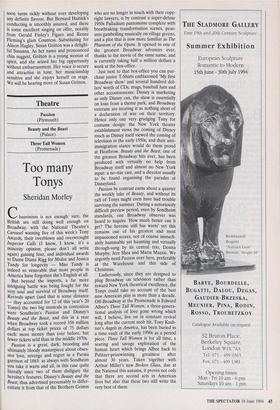Theatre Beauty and the Beast (Palace) Three Tall Women (Promenade)
Passion (Plymouth)
Too many Tonys
Sheridan Morley
Chauvinism is not enough: sure, the British are still doing well enough on Broadway, with the National Theatre's Carousel winning five of this week's Tony Awards, their overblown and overwrought Inspector Calls (I know, I know, it's a minority opinion, please don't all write again) gaining four, and individual awards to Dame Diana Rigg for Medea and Jessica Tandy for longevity — Miss Tandy is Indeed so venerable that most people in America have forgotten she's English at all.
But beyond the imports, a far more intriguing battle was being fought for the very soul and survival of Broadway itself. Revivals apart (and that is some distance — they accounted for 12 of this year's 20 Tonys) the two big musicals in contention were Sondheim's Passion and Disney's Beauty and the Beast, and this in a year when Broadway took a record 356 million dollars at top ticket prices of 75 dollars each: more money than ever before, but fewer tickets sold than in the middle 1970s.
Passion is a great, dark, brooding and ultimately bloody masterpiece about obses- sive love, revenge and regret in a Parma garrison of 1863: as always with Sondheim you take it warts and all, in this case quite literally since two of them disfigure the heroine's features. Disney's Beauty and the Beast, thus advertised presumably to differ- entiate it from that of the Brothers Grimm
who are no longer in touch with their copy- right lawyers, is by contrast a super-deluxe 1950s Palladium pantomime complete with
breathtaking transformation scenes, peas- ants gambolling musically on village greens, and a plot that is now more familiar as The Phantom of the Opera. It opened to one of the greatest Broadway advances ever,
thanks to the movie of the same name, and is currently taking half a million dollars a week at the box-office.
Just next to that box-office you can pur- chase junior T-Shirts emblazoned 'My first Broadway show' and several hundred dol- lars' worth of CDs, mugs, baseball hats and other accoutrements: Disney is marketing as only Disney can, the show is essentially on loan from a theme park, and Broadway veterans are treating it as nothing short of a declaration of war on their territory.
Hence only one very grudging Tony for costume design: the New York theatre establishment views the coming of Disney much as Disney itself viewed the coming of television in the early 1950s, and their anti- immigration stance would do them proud
at Heathrow. Beauty and the Beast, one of the greatest Broadway hits ever, has been
produced with virtually no help from Broadway itself and almost no New York input: a no-star cast, and a director usually to be found organising the parades at Disneyland.
Passion by contrast earns about a quarter the weekly take of Beauty, and without its
raft of Tonys might even have had trouble surviving the summer. During a notoriously difficult preview period, even by Sondheim standards, one Broadway observer was heard to inquire 'How much better can it get? The heroine still has warts' yet this remains one of his greatest and most impassioned scores, not of course immedi- ately hummable yet haunting and virtually
through-sung by its central trio, Donna Murphy, Jere Shea and Marin Mazzie. We urgently need Passion over here, preferably at the Warehouse and this side of Christmas.
Ludicrously, since they are designed to plug Broadway on television rather than
reward New York theatrical excellence, the Tonys could take no account of the best new American play in more than a decade.
Off-Broadway at the Promenade is Edward
Albee's Three Tall Women, a three-genera- tional analysis of love gone wrong which
will, I believe, live on in constant revival
long after the current snob hit, Tony Kush- ner's Angels in America, has been buried in
a time vault of the early 1990s as a period
piece. Three Tall Women is for all time, a searing and savage exploration of the
human heart which brings Albee back to Pulitzer-prizewinning greatness after almost 30 years. Taken together with
Arthur Miller's new Broken Glass, due at the National this autumn, it proves not only that there are second acts in American lives but also that these two still write the very best of them.


























































 Previous page
Previous page